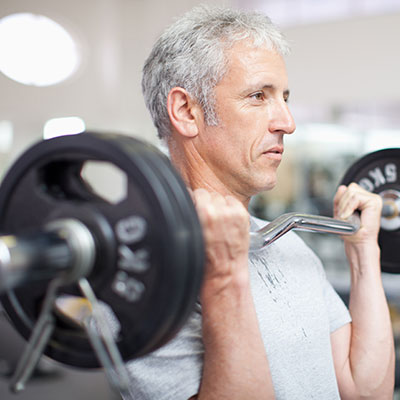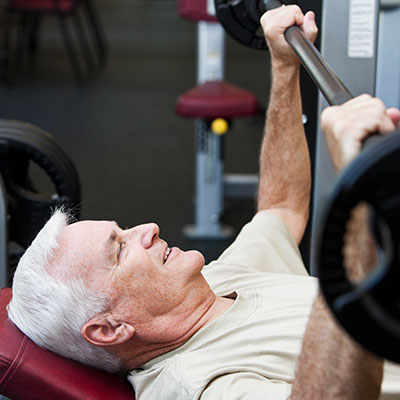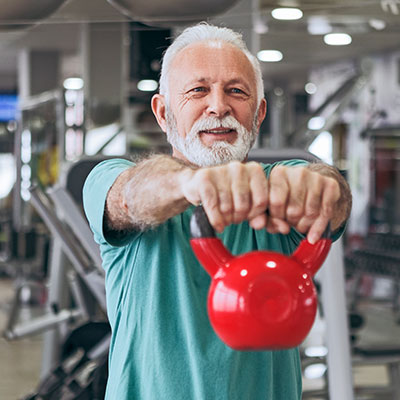HGH Therapy Benefits for Muscle Strength

There is a definitive link between your levels of HGH and your ability to build stronger muscles and burn fat and lose excess weight.
Men and women who have low levels of HGH tend to be overweight, feel weak, and have poor muscle tone. Studies have shown that growth hormone therapy can help you to increase your strength and stamina by helping you to build more lean muscle.
HGH is a vital hormone secreted by the anterior pituitary gland. HGH is known as an “anabolic hormone” because it builds and repairs tissue such as muscle. HGH stimulates the release of Insulin-like growth factor 1 (IGF-1), which also has anabolic effects within the body, aiding in the growth and repair of muscles and other tissues throughout the body.
IGF-1 and HGH also help to facilitate the body’s response to exercise. The positive anabolic and metabolic effects on the body of HGH and IGF-1 can improve exercise performance and help to increase muscle mass and muscle strength. This is particularly true of skeletal muscles.
A 2013 study published in The International Journal of Endocrinology set out to test the theory that HGH therapy can increase muscle strength in otherwise healthy males. The study found that after a six-month course of HGH therapy, the men in the study saw a “significant” increase in lower body strength, as indicated by their “before and after” ability to do leg presses. The results are indicated on the chart below.
Placebo (n = 6) | Δ | GH (n = 7) | Δ | |||
|---|---|---|---|---|---|---|
| Baseline (medium ± SD ⃰ ) | After 6 months (medium ± SD) | Baseline (medium ± SD) | After 6 months (medium ± SD) | |||
| Weight (kg) | 81 ± 15 | 83 ± 16 | 1.3 | 80 ± 13 | 80 ± 15 | 0.4 |
| BMI (kg/m²) | 26 ± 3 | 26 ± 3 | 0.4 | 28 ± 6 | 28 ± 6 | 0.2 |
| Waist (cm) | 93 ± 10 | 94 ± 11 | 1.0 | 94 ± 9 | 96 ± 13 | 1.9 |
| ∑ folds ⃰ ⃰ (mm) | 55 ± 18 | 59 ± 21 | 4.2 | 64 ± 18 | 67 ± 23 | 3.4 |
| Supine (10 MR) | 36 ± 5 | 36 ± 4 | 0.0 | 31 ± 7 | 32 ± 8 | 1.3 |
| Leg Press (10 MR) | 73 ± 12 | 77 ± 13 | 3.3 | 70 ± 14 | 84 ± 23 ⁿ | 14.4 ⁿ ⁿ |
⃰ SD: Standart deviation. ⃰ ⃰ Sum of the cutaneous folds (triceps, biceps, subscapular, and iliac folds).
ⁿ Statistically significant difference in relation to pretest (ANOVA + Fisher LSD); P = 0.034. ⁿ ⁿ Statistically significant difference for Δ value (Student’s t-test); P <0.05.
The known ability of HGH to increase strength and muscle mass is exactly why it is approved by the FDA as a treatment for the “muscle wasting” that occurs in HIV/AIDS patients and other degenerative musculoskeletal diseases. This is also the reason why HGH is banned by most amateur and professional sports commissions.
Is it Legal to Use Human Growth Hormone to Build Muscles?
It is perfectly legal to use HGH to boost metabolism and increase muscle mass IF it has been prescribed to you for that purpose. Genuine HGH therapy is an FDA-approved prescription medication. Like all prescription medications, to legally use HGH for any purpose requires a diagnosis and a doctor’s prescription.
Using HGH to build muscle or for any other purpose without a prescription is not only 100% illegal; it could be dangerous. There is a so-called “black market” for HGH, where people can and do buy HGH without a prescription. Any such black-market HGH should be avoided. It is not only illegal to use but also unregulated, and there is no control over the quality of black market HGH.
Most of the HGH sold like this come from unregulated labs in India or China. Chinese HGH has been banned in the US for many years. The use of HGH from India or China is a bad idea. These products at best contain inferior quality HGH; at worst, they may contain no HGH at all and instead can be mixed with harmful, even fatal ingredients.
Can HGH Improve Muscle Recovery After Exercise?

Most importantly, when it comes to building muscle and increasing strength, HGH improves the way your body responds to exercise. The positive anabolic and metabolic effects on the body of HGH and IGF-1 together enhance the impact of exercise – particularly strength training exercise – and help to increase muscle mass and muscle strength. This is particularly true of skeletal muscles.
Skeletal muscle is made up of striated fibers that are made up of proteins. It is the strength and health of these fibers that determine how strong and durable a given muscle is. Several studies have shown the positive role that HGH plays in the growth and repair of these muscle fibers, and therefore the impact HGH has on your overall level of fitness, your strength, and endurance.
The main reason we tend to lose strength and muscle tone as we age is that these muscle fibers deteriorate and weaken the older we get. This effect is worsened by the loss of HGH as we get older. HGH injections have been shown to help reverse this muscle loss in older individuals.
How Does HGH Impact Muscle Tone?
Due to its known anabolic properties, it is widely accepted by the medical community that HGH enhances muscle performance in sports and can improve muscle function in the elderly or in adults suffering from age-related growth hormone depletion.
HGH increases muscle strength by enhancing muscle mass. HGH also stimulates whole-body protein synthesis, providing the energy required to power muscle function.
HGH also plays an important role in metabolism because it increases lean body mass and promotes more efficient burning of fats. This is why HGH is used for athletic improvement, advanced healing of sports injuries, and to treat musculoskeletal conditions, as well as the muscle weakness that occurs due to growth hormone deficiencies.
HGH stimulates collagen synthesis in skeletal muscles and tendons, which improves physical capacity. Growth hormone also promotes glucose and amino acid uptake and protein anabolism in muscle tissue. While exercise increases muscle cell size, HGH boosts muscle cell numbers.
Benefits of Using HGH for Muscles
HGH increases muscle strength by enhancing muscle mass. HGH also ramps up protein synthesis throughout your body, providing the energy required to power muscles and help them to grow bigger and stronger.
HGH also plays an important role in how well your body burns fat because it increases lean body mass and increases metabolism. This is why HGH is used for athletic improvement, advanced healing of sports injuries, and to treat musculoskeletal conditions, as well as the muscle weakness that occurs due to growth hormone deficiencies.
HGH can also improve the health of one of the most important muscles in your body – your heart. Over the past several years, there has been increasing evidence that growth hormone therapy can have a positive impact on heart health.

In the context of this discussion of HGH and muscle growth, you need to understand that the strength of your muscles is about more than how much weight you can lift or reps you can do at the gym.
You need strong muscles to protect your bones and internal organs from damage. This is especially true of older folks, the very ones that are more likely to be suffering from age-related HGH loss. In elderly people, who are at greater risk of osteoporosis, one fall can cause life-threatening fractures. You should know that one out of every five hip fractures results in mortality within 12 months of the accident. Only two of the remaining four individuals will ever return to the level of activity and quality of life they had before the fracture.
Muscles protect the bones from damage. People who are extremely thin – without proper muscle and fat mass to cover their bones often have an increased risk of fractures. Being overweight is not what we are discussing. It is about having the ideal fat to lean mass ratio in the body. That is where the HGH benefits for muscle strength excel. HGH helps reduce fat mass while improving lean muscle tone, which can provide greater support and protection for your bones and reduce the risk of fractures.
Side Effects of Using HGH for Muscles
Any side effects or health problems you may have heard about in using HGH to build muscle usually occur in athletes and bodybuilders who are using HGH illegally to bulk up.
HGH has been shown to increase strength and enhance athletic performance in men and women. As a result, “doping” with HGH is banned from most competitive sports in the US. In 1989 the International Olympic Committee became the first major sports organization to brand human growth hormone, a banned substance. It is also banned by most professional sports leagues in the US.
In 2018 there were some controversial cases involving some high-profile athletes and the use of HGH. The most notable of which was Peyton Manning. Manning has since been cleared of any charges.
However, do not let the various sports bans lead you to believe that growth hormone therapy or testosterone therapy is dangerous or unsafe. In fact, just the opposite is true. The main reason the two hormones are barred from professional sports is because of their very real abilities to increase strength, stamina, and endurance.
As we said earlier, as long as you have been legitimately prescribed HGH and use it as your doctor instructs, you should experience little or no side effects from using HGH as directed. However, like any prescription medication, HGH therapy can have some potential side effects.
Some of the more common side effects of HGH injections include:
- Headache
- Nausea
- Vomiting
- Fatigue
- Muscle pain
- Weakness
- Tiredness
- Injection site reactions (redness, soreness, swelling, rash, itching, pain, or bruising),
- Pain in your arms or legs
- Joint stiffness or pain
- Cold-like symptoms such as stuffy nose, sneezing, sore throat.
Some of the potentially severe, though less common side effects of HGH include:
- Severe pain in your upper stomach spreading to your back, nausea and vomiting, fast heart rate
- Increased thirst, increased urination, hunger, dry mouth, fruity breath odor, drowsiness, dry skin, blurred vision, and weight loss
- Sudden and severe pain behind your eyes, vision changes
- Swelling in your head, face, hands, or feet
- Numbness or tingling in your wrist, hand, or fingers
Keep in mind that this is a list of possible or potential side effects. Most if not all of our patients on growth hormone replacement therapy go through the entire course of their program with few of any side effects. Generally speaking, HGH side effects usually occur when someone is not taking HGH per their doctor’s instructions or using HGH illegally without any medical supervision at all. The negative effects of HGH usually occur when people are:
- Abusing HGH or taking HGH injections illegally
- Taking “black market” or low-quality HGH from China or India
- Not following their doctor’s instructions
- Taking more than their recommended dosage
- Not being properly monitored by a physician
- Not reporting any HGH side effects to their doctor or healthcare provider
Conclusion
In conclusion, there is a significant amount of anecdotal and clinical evidence for the benefits of HGH for improved strength and muscle growth. Here are just a few examples.
A 2019 study looking at the impact of HGH replacement on muscle strength and tone in older men said that “Our study demonstrated an increase in muscle strength in the lower body part after HGH therapy in healthy men.” The study involved fourteen healthy men aged 50–70 years, whose baseline muscle strength was determined by leg press and bench press exercises, which focus primarily on quadriceps, the lower body part of the body, and pectoralis major—upper body part. After six months of HGH replacement therapy, the men in the HGH group did not show much difference in upper body strength, as determined by bench presses, but showed “significant” increases in lower body strength as indicted by vast improvements in strength in the leg presses.
An earlier study in 1997 found that two years of growth hormone therapy in patients who were known to have weakened muscles due to growth hormone deficiency provided significant increases in “isokinetic muscle torque.” The researchers concluded that this study provided “convincing evidence that HGH and IGF-I have a regulatory effect on muscle morphology, function, and metabolism.”
Now that you know a lot more about growth hormone and its impact on muscle strength, why not contact us today, and see if you can benefit from the life-changing benefits of HGH replacement therapy.
FAQ
What is Human Growth Hormone?
Human Growth Hormone, or HGH, is a hormone that is normally produced by your pituitary gland. It is HGH that stimulates all of the processes that allow children to grow into healthy adults of full stature. While HGH is vitally important during those growing years, we still need HGH even as adults so that we can continue to replace damaged cells and to maintain good muscle mass and bone health throughout our lives.
Does HGH Increase Strength and Muscle Mass?
Studies have found that Human growth hormone (HGH) can improve strength and physical capacity, even in subjects without a diagnosed growth hormone deficiency (GHD), through stimulation of collagen synthesis in the tendon and skeletal muscle, which leads to better exercise training and increased muscle strength. In patients that are diagnosed with GHD or are suffering from the “muscle wasting” caused by HIV/AIDS or other degenerative muscle conditions, HGH is used to help improve strength and build muscle.
Can HGH Make Me Bigger and Stronger
While some bodybuilders use HGH illegally to “bulk up,” legitimately prescribed HGH therapy is not designed to make you “bigger or stronger.” However, in children with a growth hormone deficiency, it will help them grow to their full stature. In all people prescribed HGH therapy, it can increase their muscle mass and decrease their body fat, which ultimately will lead to increased strength and better exercise capacity.
Is the Increased Muscle Mass Gained From HGH Therapy Permanent?
The increases in lean muscle and improved strength gained from HGH therapy will last so long as you live a lifestyle designed to maintain your improvements by eating right and getting enough exercise. Other things to do to maintain your HGH results include reducing stress, getting enough sleep, and limiting your consumption of alcohol?
What Is the Mechanism of Action for HGH Increasing Strength and Building Muscle?
When it comes to building muscle and increasing strength, HGH improves the way your body responds to exercise. The positive anabolic and metabolic effects on the body of HGH and IGF-1 together enhance the impact of exercise – particularly strength training exercise - and help to increase muscle mass and muscle strength. This is particularly true of skeletal muscles.
Are There Other Benefits of HGH Therapy Besides Building Muscle?
Besides helping you to burn fat and build muscle, there are many other benefits to HGH therapy. The benefits of HGH replacement therapy for people with growth hormone deficiencies are many. In children, growth hormone therapy can help them grow more normally and achieve full stature. In adults:
- HGH therapy increase energy and vitality
- HGH therapy improves skin health, lessens the appearance of creepy skin, lines, and wrinkles
- HGH replacement improves sleep
- HGH replacement increases cognitive functioning
- HGH injections help improve heart health and lower the risk of cardiovascular disease


